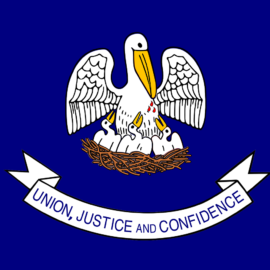
Visit Lake Charles for fun, games, and law suits.
With just over 81,000 inhabitants, Lake Charles is home to just 0.02% of the U.S. population. But after an onslaught of natural disasters in the fall of 2020 and early 2021, the city’s federal court accounts for one in five federal insurance lawsuits nationwide, according to a new analysis. Southwest Louisiana is home to the largest volume of civil insurance lawsuits in the nation, the Transactional Records Access Clearinghouse at Syracuse University found — a fact that doesn’t come as much of a surprise to legal professionals in the storm-battered city. Max Guthrie, an attorney with Lee Hoffoss Injury Lawyers, said his firm was inundated with prospective clients looking to sue their insurance company, especially ahead of the recent deadline to file such cases for homeowners affected by Hurricane Laura. “The caseload for all of the attorneys here shot up dramatically,” Guthrie said. “A huge percentage of what we’re doing are the hurricane cases.” When Guthrie joined the firm in early 2021, hurricane cases immediately began to pile up on his desk. Almost two years later, he was fielding a final wave of requests from Laura survivors, as the deadline to file cases related to that storm approached. Ahead of that deadline, August 2022 saw the largest number of insurance lawsuits filed in a single month: 4,042 such cases were filed nationwide, 40% of which were filed in Lake Charles alone. “We did everything we could to try and help as many people as we could,” Guthrie said. But in some cases, it was simply too late to do the discovery work necessary to file suit before August 28.
nola.com
Some did miss the deadline but those that were taken comprise a large proportion of the total suits filed.
While some may have missed their chance to sue, a whopping 3,430 had filed suit against their insurer at the Lake Charles federal courthouse in the 2022 fiscal year by August, with one more month to go, applicable to those affected by Hurricane Delta. That’s 22% of the total of 15,910 insurance cases filed in that same time frame in federal courts nationwide. “Last year it was huge and this year it was several times even larger,” Austin Kocher, the author of the TRAC report, said of the volume of insurance lawsuits filed in the Lake Charles federal court. “It very much felt like ground zero of insurance litigation in the country.” Trial dates for hurricane insurance cases in Lake Charles are currently set as far out as 2024 and might be pushed even further unless a significant number of cases are resolved through pre-trial settlements. The Lake Charles courthouse itself only recently reopened, after hurricane damages put it out of commission for nearly two years. Its operations had relocated to Lafayette, about an hour’s drive away.
The court has advocated settlement to try to take cases off the roster.
A few months after the storm, the court put in place a case management order aimed at reducing the amount of time spent on each case and encouraging pre-trial settlements through mediation and a streamlined discovery process. Trying all cases would be nearly impossible, said Special Master Patrick Juneau, who previously served as the claims administrator in the massive BP oil spill litigation and who helped craft the order for Lake Charles. “That would just annihilate the court system,” Juneau said. “It would take 15 years or something like that to clear that up.” Instead, around 85% of cases have been resolved before going to trial since the order was put in place. “I’m optimistic that we will have the same kind of success rate we’ve seen in the past,” Juneau said. He’s hoping that the order will serve as a model for other parts of the country, like Florida, where courts are likely to see an onslaught of insurance cases in the aftermath of Hurricane Ian.
Federal courts take most of the burden.
A majority of hurricane insurance lawsuits are filed in federal court, which has jurisdiction over cases that involve parties located in different states — most national insurers are headquartered outside of Louisiana — as well as cases dealing with an “amount in controversy” of $75,000 or more. But state courts are feeling the pressure as well. “It’s more intense, I can feel it,” 14th Judicial District Judge Clayton Davis, who currently has roughly 50 hurricane insurance cases on his docket, said about the caseload. Just like the federal court for the Western District of Louisiana, the 14th Judicial District Court relies on a special order, modeled after the one implemented by the federal court. “They can’t all be tried,” Davis said of the insurance lawsuits filed in his court. The order has been a tremendous help, he noted. “Even though there’s a lot of activity, there’s still a lot of resolution.” While the onslaught of cases has put pressure on the court, Davis said cases are being set for trial as quickly as possible and that the court can handle the case volume it’s faced with. “That’s our job, that’s what we do,” he said.
One would hope that after all the money Lake Charles has gotten recently things will be better after the next hurricane. This seasons lull has helped them.



